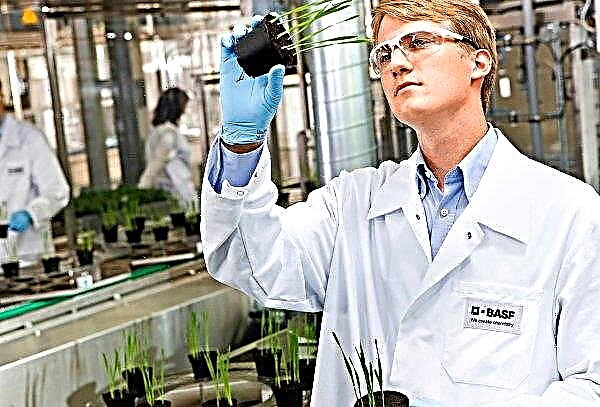One of the sweetest childhood memories is grandmother's treats with fragrant viscous honey. At that time, it seemed that tastier delicacies in the world did not exist. And few of the kids thought that with such yummy it also gets a huge portion of the benefits for the body, because the working bee-bees collected for sweets all the things that a person needs. What exactly are the sources of benefits contained in honey, and how it is useful, read on.
Did you know? To “make” 100 g of honey per day, one bee needs to collect nectar from 100 thousand flowers.
Honey features
Honey is nectar processed by bees, which they collect from honey plants. In this case, insects can not be fed with sugar syrup, so as not to spoil the quality of the product. But, like everything in this world, a sweet treat has its pros and cons. Read more about the benefits and contraindications of the product for the human body.
Benefit
- Due to its unique composition, honey is a source of beneficial properties for humans, namely:
- Helps increase immunity.
- It has good bactericidal properties.
- It is a tonic of the body.
- It is recommended for use during the rehabilitation period after undergoing surgical interventions: the trace elements and vitamins contained in the product accelerate regeneration processes.
- Helps normalize the activity of the digestive tract and intestines.
- A bee product is a good stimulant for the proper functioning of internal organs.
- Helps to maintain normal weight and prevents obesity. For this effect, sugar must be replaced with honey.
- Helps fight allergies to pollen. Here the rule “kick out a wedge” works: along with a sweet product, a person eats the very pollen that causes allergic reactions of the body. This leads to a decrease in allergic symptoms. But, resorting to this method of treating allergies is possible only under the supervision of a doctor.
- The delicacy is recommended for breakfast or before grueling physical work (for example, training). The fact is that it charges the body with energy called glycogen.
- Improves the quality of sleep.
Did you know? The word "honey" in translation from the Hebrew language means "enchantment", "endowed with magic."
Harm and contraindications
Many may have the impression that in connection with such an impressive list of benefits, honey can be eaten without restrictions on breakfast, lunch and dinner. But, this is far from the case, since it can become a source of harm to the body.
- So, the product is contraindicated in the following situations:
- It is impossible to heat honey, for example, to use it with too hot tea. So, at a temperature of + 40 ° C, a sweet treat loses its useful properties, and at a temperature of + 60 ° C it can generally become toxic.
- Excessive consumption of such natural sweetness can cause obesity or diabetes.
- A treat for allergy sufferers can be generally contraindicated, because it contains substances that provoke bronchial asthma, and in the worst case even anaphylactic shock.
- The product can become a source of dental caries.
- It is forbidden to give honey to children under the age of three. Those who are three years old are given a treat with caution, and children should eat it in small doses.
- It is recommended that those suffering from gallstone or urolithiasis, acute gastritis, ulcers, pancreatitis exclude sweetness from their diet.
Honey composition
In short, sweet nectar is a mixture of water with glucose, fructose and pollen. When it comes to a detailed analysis of its composition, thanks to the presence of many vitamins and minerals, the product has become a natural source of human health.
Vitamins
The delicacy contains almost everything, vitamins and minerals are necessary for a person. Their concentration in the composition of nectar can vary, depending on the variety.
Important! When using a bee product, it is worth taking into account its variety, that is, the fact from which plants it is made, since this can significantly affect not only the texture and color of the treat, but also its composition, and, accordingly, how it will affect per person.
B vitamins
Contained in any form of honey. So, the bee product is rich in:
- thiamine (B1). It strengthens the human tooth and bone system, cleanses the body of toxic substances, participates in the metabolism of carbohydrates, and has analgesic functions. Lack of B1 can cause problems with the heart, skin, hair;
- riboflavin (B2). Vitamin is responsible for the metabolic process;
- niacin (B3), which favorably affects a person’s vision, eliminates fatigue, prevents aging, improves the functioning of the heart and blood vessels;
- pantothenic acid (B5), which contributes to the well-functioning liver, oxygen saturation of the brain, improves carbohydrate metabolism;
- pyridoxine hydrochloride (B6). Vitamin pacifies nervous disorders, gives a feeling of calm, promotes good sleep;
- folic acid (B9), which is involved in the production of red blood cells in the brain, prevents the occurrence of trophic changes in the mucous membranes.

Vitamin C
The content of ascorbic acid in a sweet product makes it an excellent helper for a person on the way to increase immunity. Vitamin C also helps cleanse the body of toxins. Eat honey effectively for people suffering from gum problems (for example, bleeding). It is ascorbic acid that contributes to the long shelf life of sweets.
Important! Only natural honey can boast of a rich vitamin composition.
Tocopherol
Vitamin E is a source of skin health, in connection with which, honey is often found in cosmetic preparations for the skin. The list of its beneficial effects on the body includes antihistamines and anti-inflammatory functions.
Fructose
About 40% of the honey falls on fructose, which refers to slow carbohydrates. This type of monosaccharide is easily absorbed by the body and releases a large amount of energy that a person needs for a full life. This component is especially useful for people involved in sports or heavy physical activity.
Also, fructose favorably affects the work of the heart, since it quickly joins the biochemical reactions of the body. In addition, the element is able to stimulate the production of insulin, which is important for patients with diabetes.
Important! Sweet Fructose — an excellent way to combat the symptoms of intoxication: it removes alcohol from the body. Therefore, if you woke up after a stormy party and have a hard day ahead, drink tea with honey.
Glucose
Like fructose, it makes up about 40% of the total amount of honey, and is also a kind of energizer for the body. This monosaccharide is necessary for the proper and streamlined functioning of the nervous and skeletal systems. Carbohydrate is necessary for people who are engaged in mental and physical labor, as it increases efficiency.
Enzymes and Amino Acids
The composition of natural sweet nectar contains 22 amino acids, and about 5 thousand enzymes, in addition, it is rich in minerals (iron, zinc, potassium, calcium, phosphorus, magnesium, selenium). Enzymes (also known as enzymes) are complex protein molecules that catalyze the body’s chemical reactions.
Important! Some categories of people — patients with diabetes, pregnant women, nursing mothers, the elderly, children under 12 years old — require a special calculation of the maximum and recommended daily doses. If you belong to one, in order to find out the amount of “bee delicacy” you need, it is best to consult your nutritionist.
Honey is rich in diastase, invertase, glucose oxidase, catalase, phosphatase and other enzymes. Their main task is to be responsible for the proper functioning of the digestive system. Enzymes also promote wound healing, eliminate inflammation, prevent thrombosis, and prevent the formation of cancer cells.
Amino acids are protein breakdown products. Honey saturates the human body with essential amino acids, which are necessary for the proper growth and development of man, contribute to the smooth functioning of metabolism.
Norms of use
Almost all beekeepers, one ahead of the other, shout about the benefits of honey, but probably not many of them know about the rate of consumption of this product per day, so as not to harm their health. It is worth mentioning that honey is a bit of a compromise product. It has a lot of sugars, and it does not belong to low-calorie foods, but nutritionists often recommend using it in their diets. Occasionally, it can be consumed on the recommendation of a doctor, even with diabetes. The recommended daily intake of a product for a healthy adult is 2–2.5 tbsp. spoons. With a strong desire, you can eat up to 4 tbsp. tablespoons of the product - this is the maximum allowed dose per day. The norm of honey for children is two times less than for an adult, that is, no more than 2 tbsp. spoons per day.
Occasionally, it can be consumed on the recommendation of a doctor, even with diabetes. The recommended daily intake of a product for a healthy adult is 2–2.5 tbsp. spoons. With a strong desire, you can eat up to 4 tbsp. tablespoons of the product - this is the maximum allowed dose per day. The norm of honey for children is two times less than for an adult, that is, no more than 2 tbsp. spoons per day.
And if a child is fond of sweets besides honey, his amount in the diet needs to be further reduced. Honey is rich in useful substances, but those who say that this product can be eaten in plenty are disingenuous. It is worth remembering that it is completely composed of carbohydrates, and excess carbohydrates always turn into fat. Therefore, the above norms are approximate.
The exact rate of sweetness should be determined taking into account many factors; body type (athletic average, tight), way of life (active, inactive), type of work (sedentary, mental, hard work), metabolic rate, etc.
As you can see, to supply your body with the necessary vitamins and minerals, you do not need to go to the pharmacy, or buy some overseas vegetables and fruits, it is enough to regularly use natural honey. Thanks to bee labor, this product has a rich chemical composition and is one of the richest sources of benefits for the human body.












